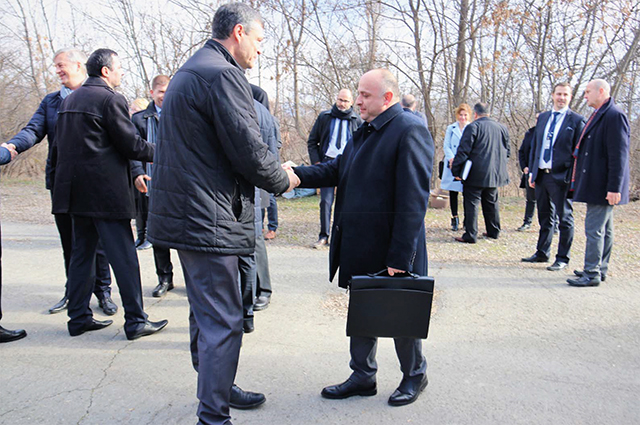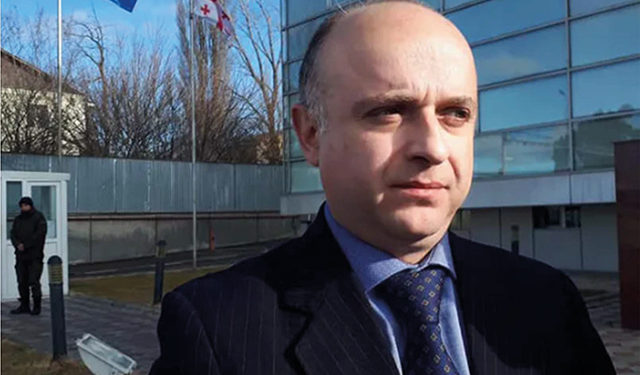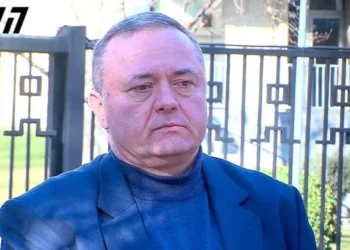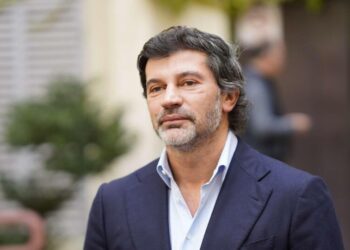INTERVIEW.
The State Security Service of Georgia is largely thought of as comparable with such storied organizations as the United States’ Central Intelligence Agency, the CIA, and the United Kingdom’s Secret Intelligence Service, or MI6. While this may be accurate in some respects, the SSSG has a very unique mission with regards to the disputed regions of Abkhazia and South Ossetia. Operating in a deeply complex environment, and with an occupation force that operates illegally, Irakli Antadze, Deputy Director of the Information Analytical Department at the SSSG, has quite the workload. In this edition of The Sit Down, GEORGIA TODAY speaks with him on the mission at these so-called borders, and the growing complications of making safe a frozen conflict zone.
Irakli Antadze, as well as being a deputy director, is also the leading participant in the Incident Prevention and Response Mechanism (IPRM), which is a tool of the Geneva International Discussions (GID), and also represents the State Security Service in those Geneva International Discussions.
How do you and your department operate within the framework of the security situation at the Administrative Boundary Line (ABL)?
The State Security Service of Georgia is the leading agency in security related issues along the ABL, which actually is an occupation line. First and foremost, let me highlight that an occupation line or ABL is merely a notion. It’s not a state border. It marks the territory that is under control of the central government of Georgia, and territories which are temporarily out of the order of the central government. So, we’re the leading agency and I’m the leading participant in the IPRM, a tool of the GID, one of the most important tools when we discuss the security related issues and ongoing incidents like borderization, illegal detentions, which are unfortunately quite frequent across the occupation lines, and also the humanitarian related issues are also subjected to the IPRM format.
Formally, it is absolutely apoliticized. Its main goal is to solve security related issues and humanitarian issues in order to make the lives of the population along this occupation line easier. As to our presence along the ABL, we are represented by our police forces, meaning our units of the Ministry of Internal Affairs, but we are the leading agency and we are coordinating in response to all security related issues along the occupation line, all related subjects such as regulations, negotiations, and also the hotline holders operating with the EUMM. It’s a daily based practice if an incident takes place or for humanitarian issues requiring a response, such as a Medical Evacuation or something like this.
We’re also activating the hotline with the hotline holders of the de-facto representatives in Tskhinvali and their representatives of the Russian occupation forces. Actually, the Russian hotline holder representative is the FSB border guard representative across the occupation line. It’s a daily practice, especially when we have cases of illegal detentions of Georgian citizens, which is quite frequent, and in cases of so-called borderization. This is another inhuman act led and facilitated by Russian occupation forces. It’s a matter of disturbance of the peaceful population residing on both sides of the line.
Within that total mission, what would you say are your short-term and long-term goals?
I will start with the long-term goals. Our long-term goal is to achieve our final goal: the full scale resolution and removal of all artificial barriers and hindrances along the occupation line, of course the removal of all occupation forces, and, finally, reconciliation between two artificially divided communities who, through the ages, have links between relatives. There are a lot of mixed families. All those problems are artificial, and started not just in the early 1990s but in the 1920s when Georgia was occupied by Soviet Russia.
As to the short-term goals, it’s our daily working routine to release our illegally detained citizens. We have illegally detained citizens in both Tskhinvali and in occupied Abkhazia. I have some figures here on the illegal detentions. For instance, in 2020, in occupied Abkhazia, they detained 13 Georgia citizens, and in occupied Tskhinvali they detained 64. Those figures are fluctuating. For example, in 2015, there were 336 illegal detentions in Abkhazia and 163 in Tskhinvali, and even more going back to 2013.
This is the main issue of our concern, because it doesn’t matter the number of illegal detainees, even if we have one illegal detainee, it’s a big problem. Of course, part of our daily routine is also reacting to illegal borderization cases and the hotline mechanism that we activate immediately when an incident becomes known. Then we inform the co-chairs of the GID, both directly and through our partner agencies, such as the Ministry of Foreign Affairs. We then try to deal with these grave incidents through the strong support of our international partners.
You mentioned, especially in the short-term, the smaller tasks that build to achieve larger goals. What are some of these smaller daily and weekly tasks?
It depends. For instance, the achievement of our biggest goal lies in some dimension with the GID, because we have the six-point agreement and the main part of this agreement is the removal of occupation forces to previous positions and launching international security mechanisms. While Russian occupation forces are still present in both occupied territories, any engagement of international security arrangements will not be effective. So first and foremost, subject to the final goal, it is to remove the Russian occupation forces. It’s a political issue and this is why we are discussing this issue in Geneva because the GID is a political format and we have strong support from the US delegation, who are permanently represented at this forum.
In light of some of the more recent actions taken by the occupation forces, what are the proactive measures being taken by the SSSG and partner agencies?
We have a constructive approach. We always refrain from any use of force or anything like that, because we deem it necessary. We have existing mechanisms to diffuse any incidents or divergence. For example, when we are dealing with illegal detainees, we use the hotline and meetings in the IPRM format, as well as the GID. We believe it to be the only way to solve all existing divergences; the use of force and actions like this are not the proper method. We try to persuade them, but in vain. The position of the central government has never been a cause for allegations that we used force or violated any rights. Yes, we have police forces represented along the occupation line, but their goal and task is to promote a secure environment. No armed encounter is in our plans.
What would you consider to be the greatest threats and obstacles to the implementation of those measures, but also to the safety and livelihood of the population and the officials present there?
The main obstacle is the presence of occupation forces on the ground. I can definitely say that the people living there have nothing to hide, as they have known each other since childhood; they are relatives. If one day comes, and I hope this comes soon, that the occupation forces leave the area, everything will be ok, because the locals will have nothing keeping them apart.
These two artificially divided communities are very traditional, and these traditions are represented throughout the age groups. So the main hindrance and obstacle is the presence of these Russian occupying forces. I can give you an example in the illegal detentions and the rising number of groundless allegations. Those practices are carried out by Russian occupation forces. If a local from Tskhinvali tries to cross the occupation line and the Russian patrol catches him, they put him in jail. Yet, we do not prohibit the movement of people across the occupation line, and it is our strong position to promote this freedom as a human right. So, what I’m trying to say is that not only Georgians are victims of this practice being carried out by Russians, but also Tskhinvali residents.
It’s clear that the forces on the occupation line are not traditional border security forces, and act in a far more militaristic manner. Is there a plan or structured response should hostilities resume?
We’re doing our best to avoid any outbreak of hostilities, because it would be detrimental not only for Georgians but also for the Ossetians who are living on the other side of the occupation line as a peaceful population. Our adherence to the principals of a full scale peaceful resolution and the position of the central government at the highest level is peace. All our activity is directed towards this direction. Our firm stance is to not only avoid but also prevent any possible outbreak of hostilities.

With the conflict came the influx of Internally Displaced Peoples (IDPs). What is the plan to assist these people, and will they people ever be able to go home?
So, when we are speaking about IDPs, it should be divided. The first wave of IDPs was in the early 1990s after the wars in the former Abkhazia and South Ossetia Oblasts, and the second wave was received after the Russian-Georgia war in 2008. I would like to underscore one important issue, that every single person from these groups is to return to their homes in both Abkhazia and in the Tskhinvali region. The children are growing up with this hope.
As to our participation in this process, we have confidence in our existing activities within the current IPRM formats. Of course, it’s the aim of the occupation forces to establish a sense of nihilism on both sets of residents along the ABL, and also the IDPs. But these people continue to live despite the risk to themselves along this line. Many times, when I meet with people who were displaced by the Russian-Georgian war, I hear that their dream is to go back to their homes, which were in fact destroyed by the Russians. Several villages that were destroyed in Tsartseni are now used as a firing range by the occupation forces.
As a general rule, contested borders go one of two ways: Either total resolution, like Ireland with the Good Friday Agreement, or total militarization, as in the case of the North/South Korean DMZ. What is the perceived outcome with the ABL here in Georgia?
From my perspective and experience, I would not draw parallels between those two cases, because every single conflict is unique. It’s determined by various factors, such as culture. If we take, for instance, Abkhazia: we have common blood; more than two thirds have Georgian surnames. So, what is the core of those two wars? The core is purely artificial. The Russians have poisoned them, even as Abhaz people are studying their language, they speak Russian. The only way to rescue them in the long-term perspective is to have them live with us, because nobody here is going to do anything terrible to them. We see them as our brothers. It’s the same for Ossetians.
The only final outcome should be the removal of occupation and a full scale resolution. Believe me, it’s possible if we eliminate or at least minimize the negative influence of the Russian presence. They are operating, for example on social media, with Cold War wording. They are living in the past, in the USSR. The more progressive youth, who are more or less well educated, want to see more. For example, Abkhazia has one of the most beautiful coastlines, but the infrastructure remains destroyed, the result of living with Russia.
The recent move near Khurvaleti shows the brash nature of the Russian FSB, GRU, and other forces deployed against your teams at the ABL. Do you feel that this is a sign of things to come, or only a one-off operation into Georgia?
It’s just another visible example as to how Russian occupation forces are operating. We have many incidents. For instance, last year, they captured Zaza Gakheladze and wounded him. They shot him in the leg and illegally deprived him of his liberty. It’s one more example of the ugly face of occupation. A majority of the illegal detentions take place on Tbilisi-administered territory. For example, the man who was chased by Russians was cultivating his land. It’s often very difficult to distinguish whether you are on Tbilisi-administered territory, or out of it. As I mentioned before, the ABL is merely a notion. Those farmers don’t have GPS navigation, so that’s why we always stress out meetings in both formats the need to apply a humanitarian approach. When you are tending to cattle or foraging in the forest, how, without GPS, are you able to identify your location? The Russians are trying to do this to establish that nihilism, and also to push their politically motivated goals. But it won’t work, because those people living there are aware and they love their homes and they will never abandon them.
Interview by Michael Godwin














